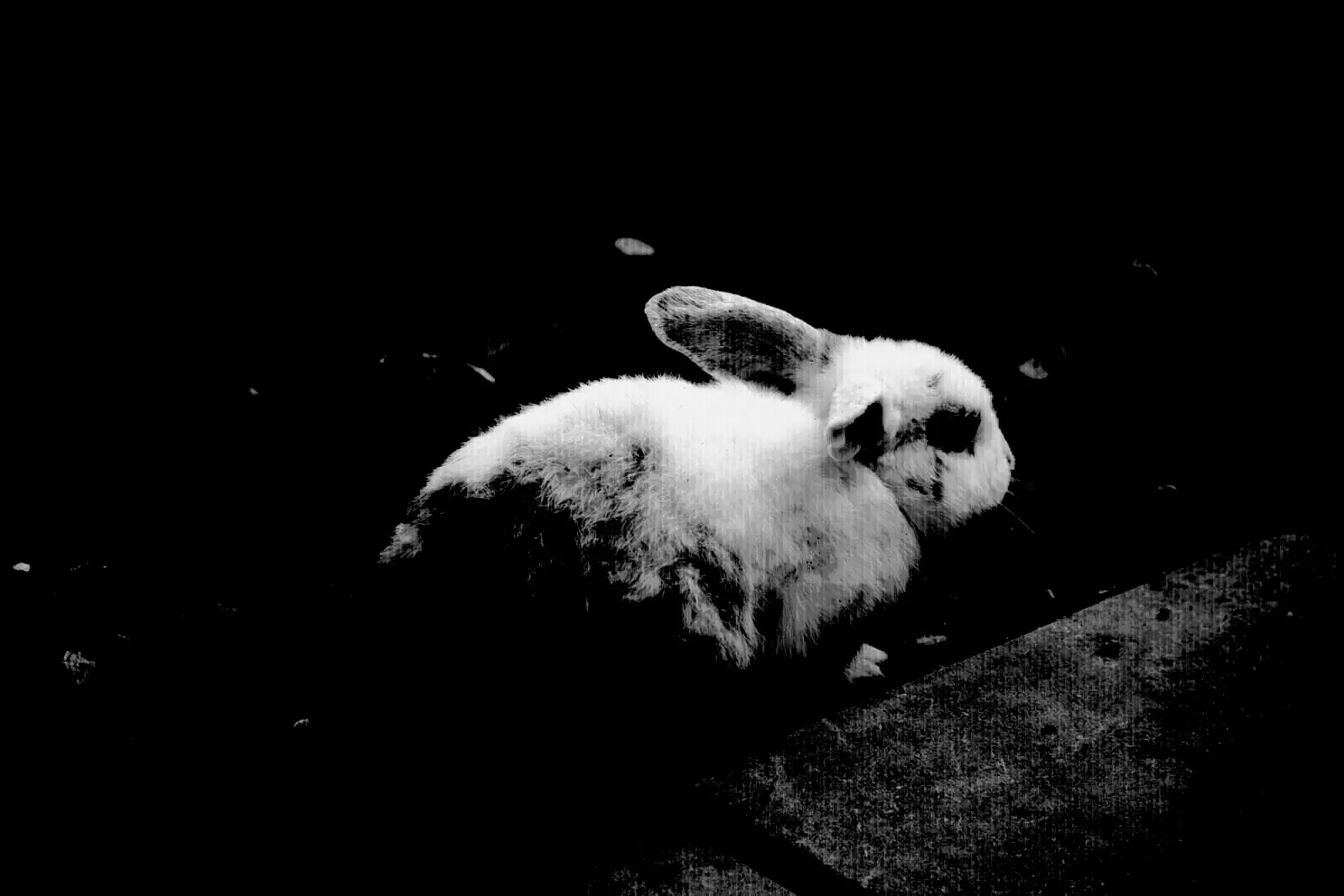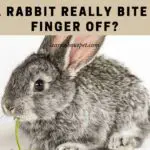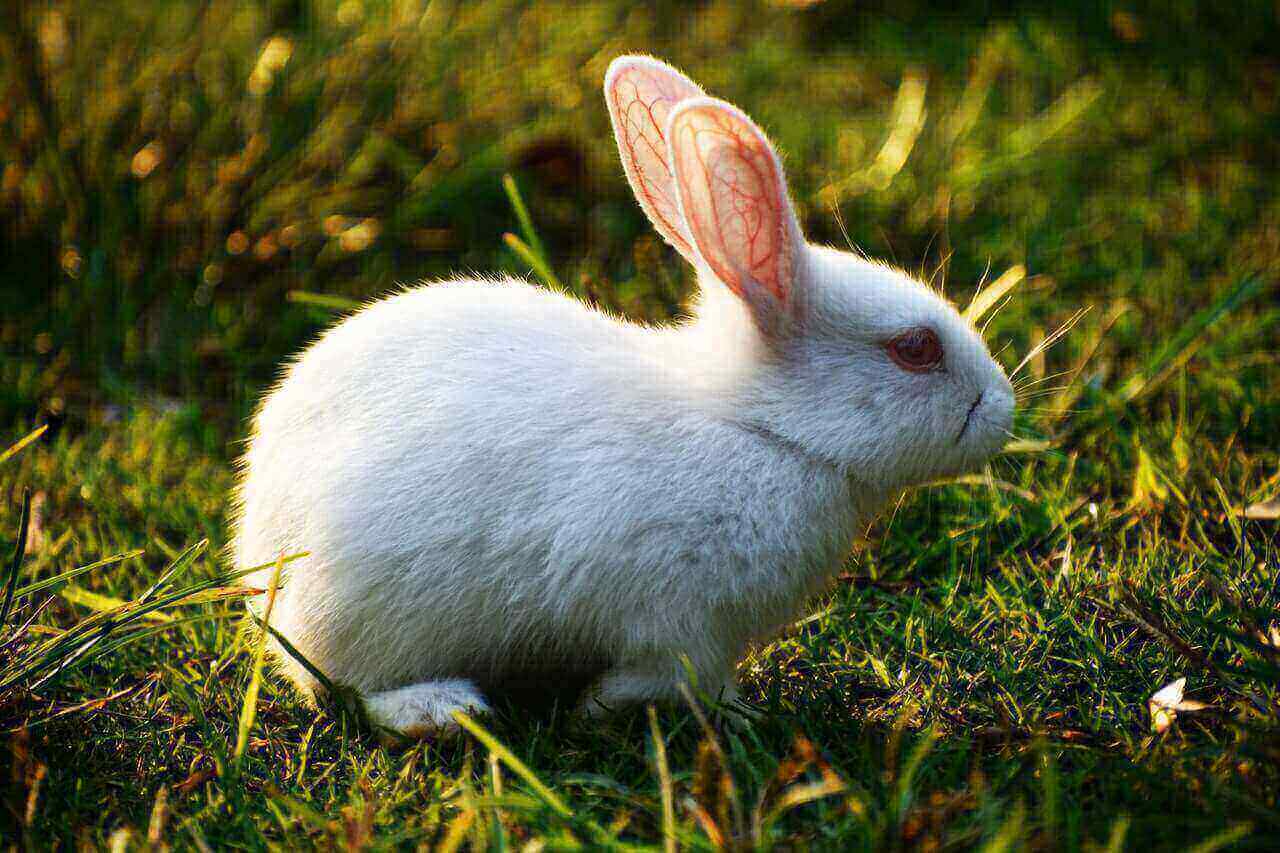It can be very disconcerting to notice that your ferret has goopy eyes. Once you make this observation, you will most likely want to know the possible reasons for the ferret having such goopy eyes. You will also probably want to know what you can do about the goopy eyes. This article has the answers.
Ferret goopy eyes can be a sign of distemper. They can also be due to other eye infections, or due to irritation that is as a result of an allergic reaction.
Much depends on the exact color of the discharge that is making the ferret’s eyes goopy. Is it a clear discharge? Or is it green or yellow?
The color of the discharge is very helpful in understanding the cause behind the ferret goopy eye problem.
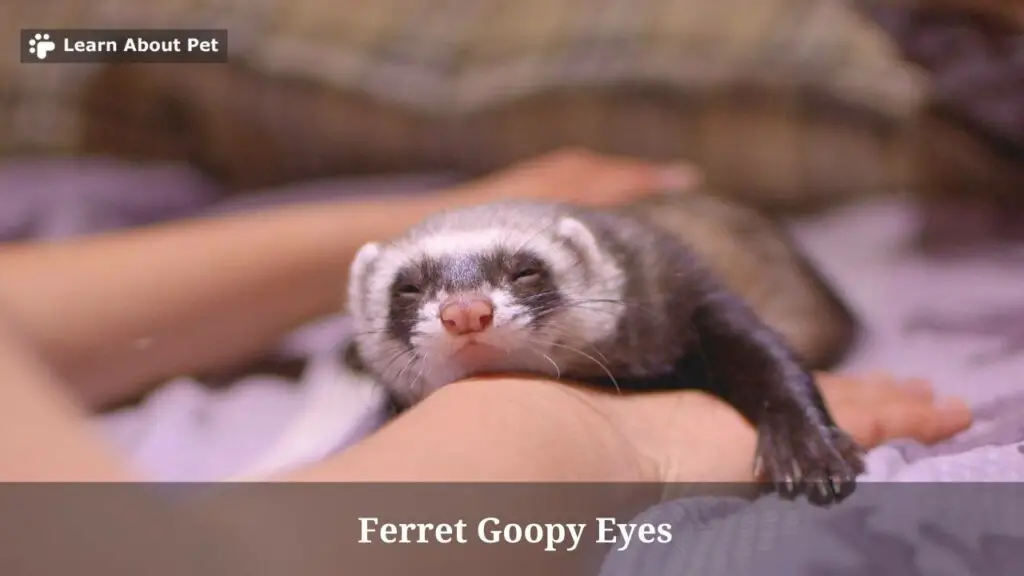
Further, in trying to understand the reason behind goopy eyes in ferret, you need to check what other symptoms the ferret is exhibiting.
For instance, is the ferret eating normally, in spite of having the goopy eyes? Is the ferret acting normally, in spite of having the goopy eyes? Or is it a situation in which besides having goopy eyes, the ferret also has other disturbing signs?
Further, ask yourself, is the discharge coming from the eyes alone? Or is the discharge also coming from the nose, as well as the eyes?
You may also need to consider how long the ferret has had goopy eyes. Whether the color of the discharge has changed over time is another relevant consideration.
Ultimately though, the underlying cause is likely to turn out to be distemper (usually the most worrisome), eye infections, allergic reactions or dental problems.
What Does It Mean When A Ferret Has Goopy Eyes?
When we say that a ferret has goopy eyes, we are simply implying that the ferret has some sort of eye discharge.
The discharge in question (which is making the eyes goopy) may vary in color: from clear to yellow and green.
If the discharge is heavy (or it dries on the ferret’s eyes), it may look like mucus. So in this case, we find the whole thing has turned into ferret eye boogers.
But goopy eyes are simply eyes from which a discharge is coming out.
If your ferret has goopy eyes, it may mean that he has a condition like distemper. Or it could mean that the ferret has something less worrisome, like an allergic reaction.
Goopy eyes could also mean that the ferret has an eye infection.
Why Does My Ferret Have Goopy Eyes?
To understand why your ferret has goopy eyes, there are several relevant questions to ask yourself.
Firstly, you need to ask yourself what color the eye discharge (which makes them ‘goopy) is.
Sometimes, the discharge is clear in color: in other words, it is watery. And that gets you wondering, why are my ferrets eyes watery?
At other times, the discharge is yellow or green in color. It may also start out clear, and then turn green or yellow with time.
So you first ask yourself what color the ferret eye discharge is.
Secondly, you ask yourself, what other symptoms does the ferret exhibit? Is the ferret lethargic? What about the ferret’s appetite: is it normal? And is the ferret’s stool normal? Those are relevant questions here.
Thirdly, you ask yourself, how long has the ferret had goopy eyes? Is it a new problem? Or is it a longstanding problem?
On the basis of the answers you get to these questions, you may be able to tell why your ferret has goopy eyes.
Ultimately, the possible causes for the ferret having goopy eyes will range from distemper to eye infections and allergic reactions. Let’s look at each in turn.
Distemper As A Possible Reason For Ferret Goopy Eyes
A ferret that has distemper often develops goopy eyes as one of the first signs.
Ferret distemper is one of the most worrisome things to consider, if you ferret has goopy eyes.
After what period of time does distemper in ferrets cause goopy eyes? This is usually within a few days of the ferret getting infected with the distemper virus.
As mentioned earlier, among the first signs of distemper in ferrets is eye discharge: giving rise to goopy eyes.
If you research on what are signs of a sick ferret with distemper, goopy eyes are usually near the top of the list. In this case, the discharge is specifically either yellow or green.
Other signs may include a high fever, as well as loss of appetite and a high degree of lethargy. In due course, the ferret may develop seizures and possibly lose its life…
Therefore if a ferret has goopy eyes, alongside those other signs, it may be due to distemper.
A ferret with distemper requires urgent treatment. If you research on how long does distemper last in ferrets, you see that it can cause death in as little as a couple of weeks.
That is why urgent veterinary care is necessary.
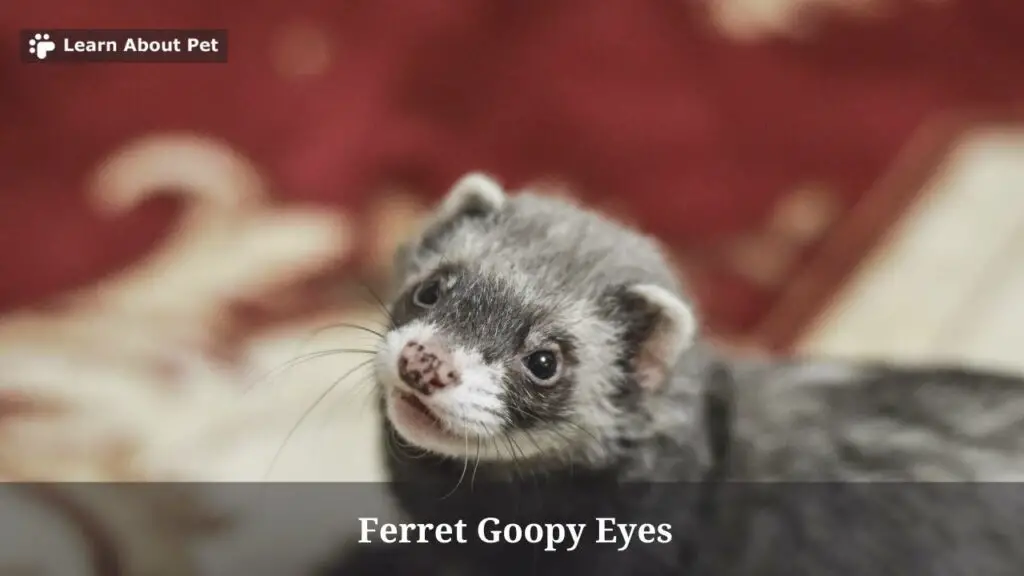
Eye Infection As A Possible Reason For Ferret Goopy Eyes
There are instances in which having goopy eyes is an indication that a ferret has an eye infection.
How do ferrets get eye infections? This is typically by coming into contact with bodily fluids from infected animals. But some infectious agents may also be airborne.
And what starts as eye trauma may, in due course, turn into infection if pathogens gain entry.
Sometimes, the infected ferret eyes may become painful. They may actually be so painful that the ferret starts eating with eyes closed.
The whole thing can become chronic: to a degree that you start wondering, why do ferrets eat with their eyes closed? Yet the problem turns out to be due to pain which is in turn due to an eye infection.
In case the goopy eyes seem to be due to an eye infection, it may be necessary to organize for urgent ferret eye infection treatment.
You need to understand that ferret eye problems that are due to infections can have serious consequences. They can even lead to loss of ferret eyesight. So the stakes may be very high here.
Allergic Reaction As A Possible Cause For Ferret Goopy Eyes
Sometimes, the reason for the ferret having goopy eyes turns out to be an allergic reaction. In this case, the discharge tends to be clear. And it may affect both the eyes and the nose.
Therefore if my ferret has goopy eyes and nose, and the discharge is clear, I would suspect an allergic reaction. This would normally be after exposure of the ferret to one or another allergen.
If the discharge dries around the eyes, it can turn into boogers. And this then gets you wondering, why does my ferret have eye boogers? Subsequent investigation reveals that it is due to an allergic reaction.
If exposure to the allergen continues, the goopy eyes problem may become chronic. So you find that the ferret’s eyes are always goopy. And you find yourself asking – on behalf of the ferret – why is my eye always goopy?
Therefore the underlying issue may be exposure to allergens, which causes allergic reactions. The allergic reaction subsequently irritates the eyes, with a clear discharge as the end result.
How To Deal With Goopy Eyes In Ferrets?
How to deal with goopy eyes in ferrets depends on several factors.
It depends on the color of the discharge. Further, it depends on how long the goopy ferret eyes problem has lasted. And it also depends on what other symptoms the ferret may be exhibiting.
Generally, if the discharge is yellow or green, the best thing is to rush the ferret to a vet. This sort of yellow or green discharge may be due to an eye infection. It could also be due to distemper.
Such issues require urgent veterinary treatment. So with green or yellow goop, it is best to simply rush the ferret to a vet.
If the discharge is accompanied by other symptoms such as loss of appetite and lethargy, urgent veterinary care is necessary.
In case of clear discharge (that is, not green/yellow) though, you may consider applying ferret eye drops at first. So you clean the discharge, and apply saline eye drops.
However, if the discharge continues, in spite of applying the eye drops, it is best to take the ferret to a vet. This also applies if the discharge seems to change color: from clear to, say, yellow or green.
Final Verdict – Ferret Goopy Eyes
A ferret is said to be having ‘goopy eyes’ if there is discharge in its eyes. This discharge may be clear, or it may be yellow or green.
Goopy eyes in a ferret may be a sign of distemper, a very worrisome disease. But they may also be due to eye infections or due to allergic reactions.
The color of the discharge, how long the ferret has had it and what other signs the ferret is exhibiting are helpful considerations. They are helpful in figuring out the reason for the ferret having goopy eyes.
What to do about a ferret’s goopy eyes depends on what seems to be the underlying cause.
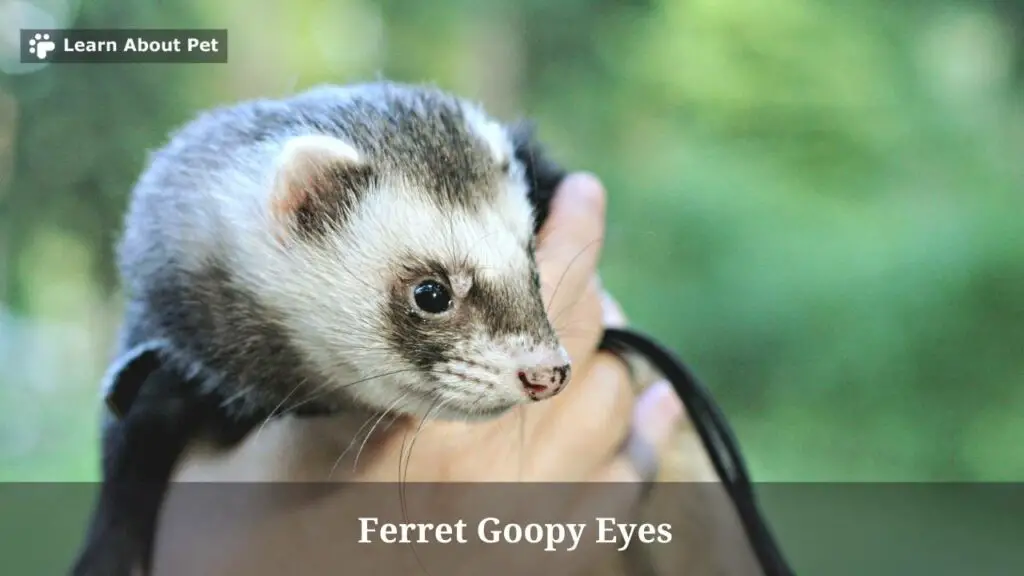
Generally though, if the discharge that is making the ferret’s eyes goopy is yellow or green, urgent veterinary treatment is necessary.
That is because such yellow or green discharge is typically due to things like distemper or eye infections. And those require very urgent treatment, to avoid worse outcomes.
Goopy eyes accompanied by loss of appetite or lethargy also require urgent veterinary attention.
But in case the discharge is clear, you may apply ferret eye drops, while also observing the ferret closely.
If the problem persists, in spite of you applying the eye drops, seek veterinary treatment. Similarly, if the color of the discharge changes, from clear to yellow or green, veterinary treatment is necessary.
As a pet lover, make sure to learn about pet more and give your pet ferret a good and comfortable life!

Welcome to Learn About Pet. My name is Rajkumar Ravichandran and I love all pets, travel, and amazing food. I write about my passion and personal experience caring for multiple pets in this blog! ❤️
Post Disclaimer
DISCLAIMER: THIS BLOG OR WEBSITE, "Learn About Pet", DOES NOT PROVIDE YOU WITH MEDICAL ADVICE AND IS NOT A SUBSTITUTE FOR MEDICAL ADVICE. ALWAYS GET IN TOUCH WITH YOUR PERSONAL VETERINARIAN AND USE INFORMATION HERE AS GENERAL ADVICE.
The information, including but not limited to, text, graphics, images and other material contained on this website are for informational purposes only. No material on this site is intended to be a substitute for professional veterinary advice, food recommendation, diagnosis, or treatment. Always seek the advice of your veterinarian or other qualified health care provider with any questions you may have regarding a medical condition or for pet food related questions.

